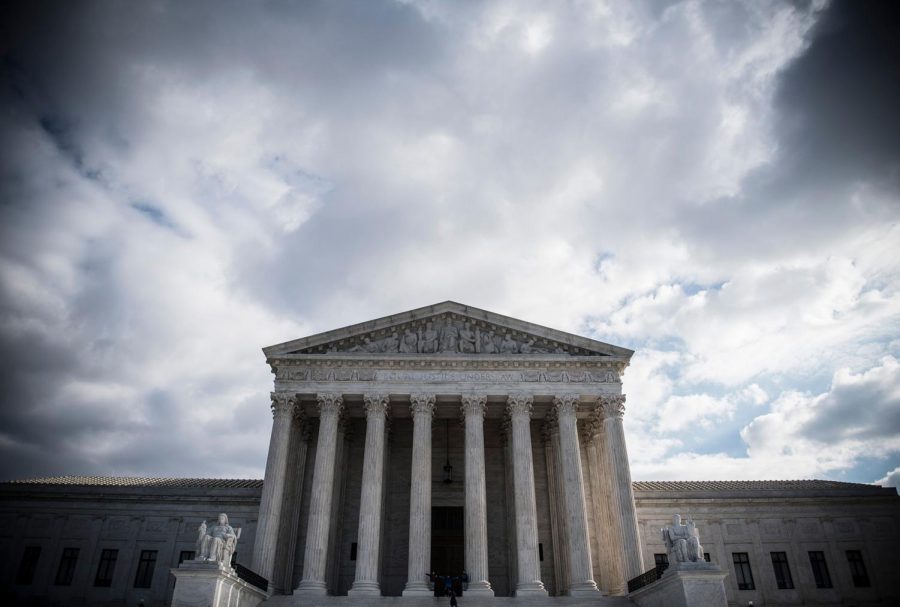Supreme Court rules for Trump’s ban on transgender troops in the military
The Supreme Court has ruled that the Defense Department can enforce President Donald Trump’s policy banning transgender people from serving in the military.
January 22, 2019
WASHINGTON – The Supreme Court on Tuesday set aside nationwide orders from three federal judges and ruled the Defense Department could now enforce President Trump’s policy that effectively bans transgender people from serving in the military.
The justices acted on a 5-4 vote, over dissents by Justices Ruth Bader Ginsburg, Stephen G. Breyer, Sonia Sotomayor and Elena Kagan.
The court’s decision, though not a final ruling on the constitutional question, is a significant victory for Trump and his lawyers. Last month, they filed emergency appeals in the high court and urged the justices to act now to put Trump’s ban into effect while the legal fight continued in the lower courts.
Advertisement
Trump’s Solicitor Gen. Noel Francisco said keeping the president’s policy on hold “posed too great a risk to military effectiveness and lethality,” and he urged the court to defer to the “professional judgment” of the military’s leaders.
The decision suggests the justices are likely to uphold the Trump policy when the constitutional case eventually reaches the high court. But advocates for the transgender troops believe their lawsuits will reveal the Defense Department had no valid basis for reimposing a discriminatory policy.
The court refused to hear the appeals immediately, leaving the issue to be decided first by federal courts of appeal.
In Trump vs. Karnosky and two companion cases, the court said the “preliminary injunction is stayed pending disposition of the government’s appeal” in the lower courts. The four dissenters said they would have denied the request to lift the injunctions.
The outcome leaves the status of transgender troops in doubt.
In 2016, Defense Department officials in the outgoing Obama administration decided transgender individuals would be permitted to enlist in the armed forces, and none would be discharged solely because of their gender identity. Under the judges’ orders, that policy had remained in effect.
In June 2017, however, President Trump tweeted the “United States government will not accept or allow” transgender people “to serve in any capacity in the U.S. Military.” He told then-Defense Secretary James N. Mattis to devise a new policy to put his edict into effect.
Advertisement*
Early last year, the Defense Department adopted this more restrictive policy for transgender individuals; officials said it stopped short of a total ban. “Transgender persons should not be disqualified from service solely on account of their transgender status,” it said. Transgender individuals, however, “would be required to serve in their biological sex,” the lawyers explained, while those who would undergo a transition “would be presumptively disqualified from service.”
Service members who identify as transgender “would be permitted to continue serving if they do not seek to undergo gender transition, are willing and able to serve in their biological sex and are able to meet applicable deployability requirements,” the lawyers told the court.
The Defense Department said it had exempted transgender troops who had revealed their identity in response to the 2016 policy, and it said 937 troops could continue to serve openly as transgender people under the new policy.
Studies and surveys cited by advocates say about 9,000 and perhaps as many 15,000 transgender persons are serving now in the military.
Acting in response to lawsuits, federal judges in Riverside, Calif.; Seattle; Baltimore; and Washington, D.C., issued nationwide orders blocking Trump’s policy from taking effect on the grounds it appeared be unconstitutional. Two weeks ago, the U.S. Court of Appeals for the District of Columbia reversed the judge’s order in one case and said the new policy was not an absolute ban on transgender people serving in the military.
Advocates for transgender troops disagreed. The D.C. circuit court’s “decision is based on the absurd idea that forcing transgender people to suppress who they are in order to serve is not a ban,” said Jennifer Levi, transgender rights project director for LGBTQ Legal Advocates & Defenders. She noted then that the three other injunctions were unaffected.
In early December, Trump’s lawyers had asked the Supreme Court to either take up the cases directly without waiting for a ruling by an appeals court or to issue an order setting aside the lower court injunctions so Trump’s policy could take effect. The justices decided on the second option.
Separately Tuesday, the high court took no action on another appeal from Trump’s lawyers asking the justices to reconsider rulings that blocked the president’s planned repeal of the deportation protection granted to 700,000 young immigrants known as Dreamers.
Advertisement








